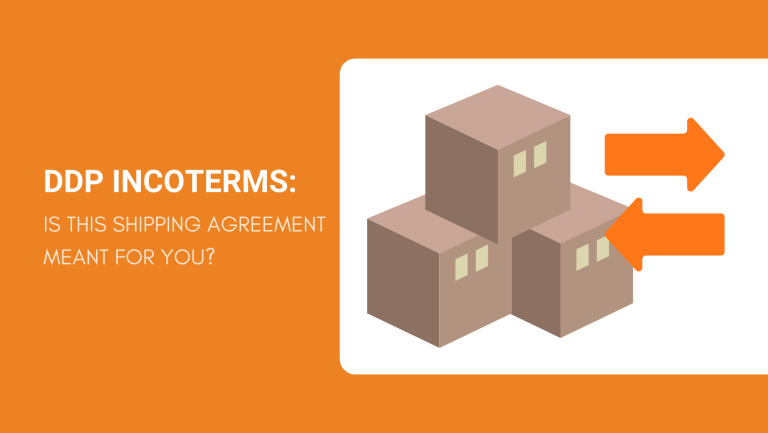The international shipping business operates with certain rules and regulations. As many steps are involved in getting the goods delivered from one country to another, there are different types of agreements to categorize the shipping responsibilities.
DDP Incoterms is one of such shipping contracts. In this article, you will learn about these Incoterms including their rules, responsibilities, importance, and when and how to use this contract in your favor.
So, satiate your need with this article to be an expert DDP importer to get the most out of your shipping deal with your sellers.
Let’s start.
What Does DDP Stand For?
The DDP is a shipping terminology and it stands for “Delivered Duty Paid”.
The word “Delivered” means that the goods are delivered at the required place and the “Duty Paid” means that the customs taxes including export and import duties are paid off by the seller.
We will discuss these terms in detail in the coming sections of this article.
What Are DDP Incoterms?
The word “Incoterms” is the acronym for “International Commercial Terms”. So, the DDP Incoterms are the rules and regulations of international shipping deals that are set out and agreed upon internationally.
The buyers and sellers who opt to have a deal under DDP Incoterms would have to abide by these terms and conditions.
Under the DDP Incoterms, the seller is responsible for everything until the goods are delivered to the destination site that the buyer specifies. This place of destination is most probably the buyer’s business location in his own country.
DDP Meaning and Importance in International Trade
The DDP holds much importance and relevance in international trade and is one of the widely used shipping agreements.
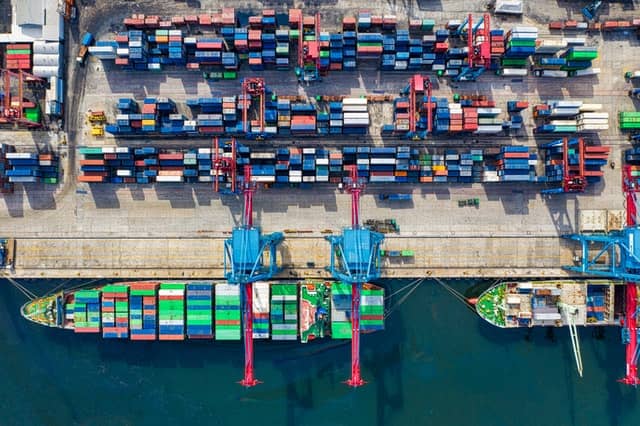
As there are more buyers internationally who would want their goods delivered to their own site, the demand, and importance of DDP have been growing day by day.
The buyer is almost risk-free in the DDP agreements and hence they prefer to go for such contracts so that they don’t have to worry about anything except receiving the products and unloading them at their warehouse.
The sellers are also comfortable in choosing the DDP contracts as this gives them plenty of opportunities to increase their profit margins all the way from the origin of goods to the destination of the shipment.
Let us discuss the responsibilities and obligations of sellers and buyers under DDP Incoterms.
Responsibilities of Sellers and Buyers in DDP Incoterms
DDP puts most responsibilities on the sellers as they have to be responsible for arranging and paying for everything from start to finish until the products are delivered to the named place of the buyer.
Following are the responsibilities of sellers and buyers according to the DDP Incoterms.
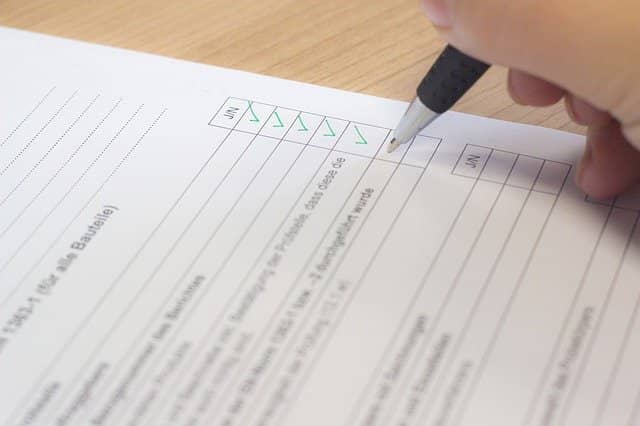
Seller’s Responsibilities in DDP Incoterms
- Arranging the goods ordered by the buyer.
- Sharing the bill or invoice of the goods.
- Preparing the formal documentation.
- Packing the goods to make them ready for export.
- Marking the items as per the export SOPs.
- Arranging the customs formalities and licenses.
- Arranging the pre-carriage and delivering the goods to the port.
- Paying for the loading charges.
- Arranging and paying for the main carriage.
- Arranging and providing proof of delivery at the port.
- Arranging and providing all the import documentation.
- Paying for the inspection and import clearance charges along with taxes such as the value-added tax (VAT) at the time of import.
- Unloading at the port.
- Arranging freight for onward carriage.
- Delivery to the location of the buyer.
As you can see, most of the tasks and sub-tasks involved in delivering the goods from the seller’s country to the buyer’s location in his country are the responsibilities of the seller in DDP contracts.
Buyer’s Responsibilities in DDP Incoterms
The buyer is responsible for the following tasks in DDP agreements.
- Paying for the goods as per the rates decided with the seller in the agreement.
- Unloading goods at the named place of destination.
- Help seller in matters related to the tasks in buyer’s country.
As you can see, the buyer is not responsible for any of the main processes involved in this shipping deal.
How Does DDP Shipping Work?
The DDP shipping works in the same way as it works in other shipping deals. It is just that the main processes have to be done by the seller. A typical example of the DDP contract has been explained as under.
Let’s say that you want to import products from China and you want them to reach your warehouse in the USA.
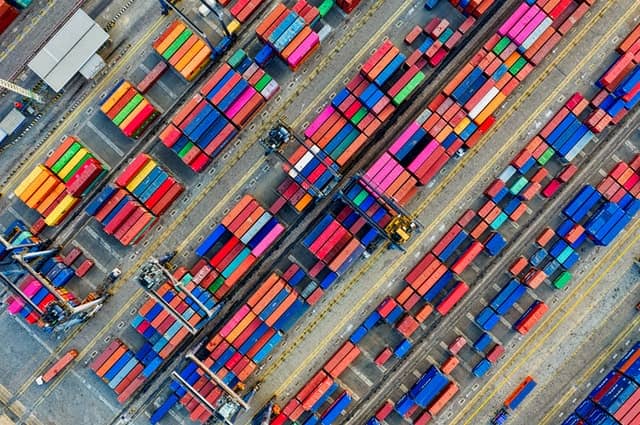
You don’t want to get involved in any of the processes like the freight, import, export formalities, etc.
You will contact sellers or product vendors in China who are willing to make a shipping deal according to DDP Incoterms.
You will select a seller and sign the DDP agreement with him after negotiating the prices of the goods and shipment charges, etc.
You will just have to share the place of delivery in the USA. It can be the address of your warehouse or your business location where you want those products.
The seller will then be responsible to arrange the products and ship them to your location. He will be responsible for all the steps and any kind of damages before the goods reach your destination.
Risks and Costs in DDP Incoterms
We have already established the fact that the risk factors are very high on the sellers in DDP agreements as he is the one responsible for over 90% of the shipping process in this contract.
Let’s see what risks are involved for both parties in DDP agreements.
Seller Risk and Costs in DDP
The seller is at high risk in DDP contracts because he has to perform every task from start to finish. Similarly, the costs involved from the seller for arranging every facility are also high.
The salient risk factors and costs that the seller has to face in DDP agreements are briefly described below.
Freight Arrangements
DDP puts the responsibility of almost every kind of freight and transportation on the seller. Therefore, the risks of any issues or delays in freight arrangements have to be faced and resolved by the seller.
If there is a transport strike or sudden price hike after signing the DDP deal, these additional risks and costs will be the seller’s headache.
This situation can get worse for the seller if he has to face such issues in the destination country as he will most probably not have such a strong network of cargo in the destination country.
Damages During Transport
If the goods get damaged due to any reason before reaching the named place of destination, the additional costs or adjustments have to be compensated by the seller.
Customs Issues on Both Sides
DDP also binds the sellers to fix customs issues and pay for any kind of customs taxes, etc.

While the vendors in China are mostly experienced with handling export duties and taxes, it can be a problem for the Chinese-seller in special cases of custom delays and increase in taxes, etc.
Uncertainty Factors
The seller is at high risk at the port in the destination country as he might not be fully aware of the taxes and customs procedures. We will discuss this point in detail in a separate section of this article.
Buyer Risks and Costs in DDP
The buyer is at minimum risk in DDP contracts. That is because he doesn’t have to be responsible for anything until the goods reach his premises. Still, the potential risks and costs a buyer has to face in DDP are described below.
Higher Contract Costs
As a buyer is free from any kind of headaches in DDP, he enjoys this favor at high costs. A DDP contract is one of the most expensive contracts in shipping agreements.
Unloading Charges at Place of Destination
The seller will only deliver the goods at a buyer-specified place. He will not help buyers unload the goods. So, the buyer has to arrange the unloading facilities on his own. Any damages during the unloading will have to be faced by the buyer.
Optional Assistance in Customs Clearance
The seller may ask for assistance from the buyer in clearing the goods from the local customs authorities in the destination country. However, it still remains the seller’s responsibility.
The VAT in DDP
The value-added tax (VAT) is a major contributor to customs duties and taxes in the countries of destination. The VAT is mostly applicable in the form of a percentage of the value of goods imported.

It can be as huge as 20% to 30% of the value of the goods. So, it remains the point of concern in every shipping deal.
Therefore, the buyers and sellers usually discuss this before finalizing the agreement.
A seller may ask the buyer to pay the VAT himself and the buyers may agree to do so. In this case, the overall cost of the DDP agreement does not include the VAT factor.
If the buyer is not willing to pay the VAT, the seller will assume this responsibility and will adjust the amount of VAT in the agreement.
When Should You Choose a DDP Agreement?
As per the terms and conditions under DDP Incoterms, this kind of shipping agreement seems to be meant for the buyers or importers who don’t want to take hassle in any of the import steps.
Keeping in view the rules of DDP Incoterms, this kind of agreement seems suitable for the following types of buyers:
- If the buyer is new in the import and export field.
- Buying or importing something for the first time.
- If the buyer is not willing to take any responsibility for the goods from start to finish.
- If cost savings and budget are not an issue for the good to be imported.
- If the buyer has little or no knowledge in the fields of import and export process, freight solutions, shipping norms, etc.
- If the goods are sensitive and the buyer wants to put every responsibility on the seller.
Tips for a Profitable DDP Agreement for Buyers
If you want to import goods from another country and you are planning to go for a DDP contract with the seller, you should consider the following tips to make the deal in your favor.

- Carry out a detailed analysis on shipping costs by analyzing other forms of shipping Incoterms like FCA, CIP, DAP Incoterms, etc.
- Additionally, you must also consider contacting a good product sourcing agent to buy from a China factory directly. In this way, you may be able to compare the overall costs of importing goods from another country.
- Always try to calculate the costs of doing some of the steps yourself and through your seller. For example, you may calculate the VAT cost and try to cover this step yourself. In this way, you will be able to validate your seller’s prices.
- Contact different suppliers and make a comparison chart of pricing offered by every seller so that you may be able to negotiate the final offer with your seller in the DDP contract.
Pros and Cons of DDP Incoterms
Let us discuss the pros and cons for the buyers and sellers in the DDP shipping agreements.
Pros of DDP for the Seller
Following are the advantages that a seller may enjoy in having a DDP agreement.
- Full control of all the processes before delivery of goods at buyer’s place.
- The seller is liable for greater responsibilities of the shipping steps. It means higher revenue and good profit margins for the seller at each step.
- Liberty to utilize seller’s own setup of shipping and cargo if available.
Cons of DDP for the Seller
The seller has to face the following cons or disadvantages in DDP deals.
- Most of the risks are on the sellers in DDP agreements.
- Natural or unannounced delays will have to be suffered by the seller.
- Higher chances of returns and refunds in case of product damages.
- The seller may face issues in dealing with the local issues in the country of destination where he might not have much experience.
Pros of DDP for the Buyer
The following are the pros or advantages that a buyer enjoys in DDP contracts.
- Worry-free product delivery right at the place of his choosing.
- The buyer is not responsible for any product damages during these steps.
- No need to take care of the legal and customs formalities.
Cons of DDP for the Buyer
The cons or disadvantages that a buyer has to face in DDP contracts are as follows.
- Very little or no control over the import and export possess.
- Higher cost of the shipment due to higher responsibilities of the seller.
FAQs for DDP Incoterms
We have answered the frequently asked questions regarding DDP Incoterms. Have a look at the answers.
What Is the Difference between DAP and DDP?
DAP and DDP are both Incoterms and can be referred to as the terms and conditions of the global supply chain agreements.
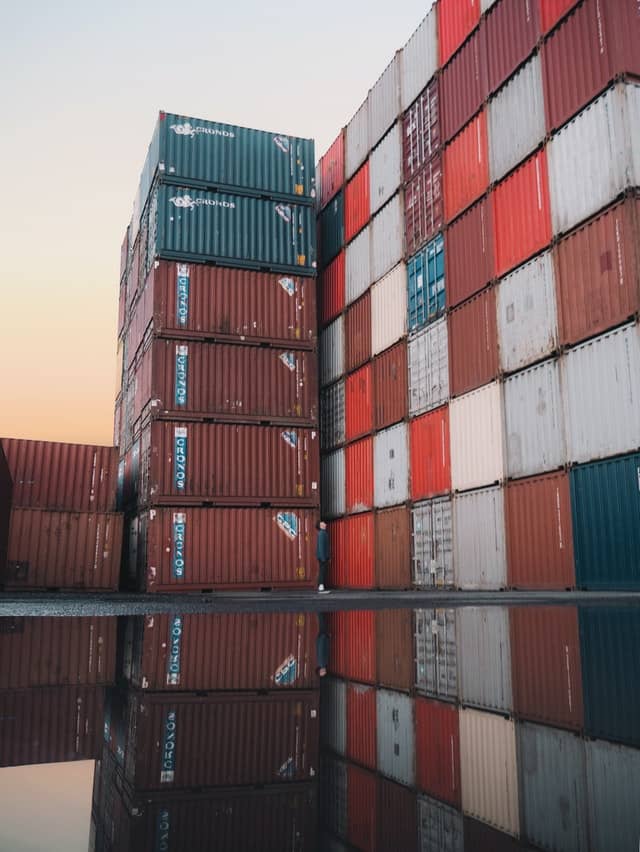
The DAP Incoterms means “Delivered at Place”. In this type of shipping agreement, the seller is only responsible to deliver the products at the named place of delivery that is specified by the buyer.
In DAP agreements, the buyer is responsible for unloading the goods at the named place of delivery along with arranging and paying for onward carriage. The buyer also has to pay for the customs duties and taxes in the DAP.
So, the risk transfers from the seller to the buyer when the goods are delivered to the decided place. The rest of the responsibilities are on the buyer.
In contrast, the DDP agreements put all the responsibilities on the seller until the products are delivered at the location specified by the buyer.
Is DDP the Same as Door to Door?
Yes. In a way, the DDP agreement is quite the same as the door-to-door delivery.
The door-to-door delivery means that the products will be picked from the source and delivered to the destination at the seller’s risk. The DDP agreement is also the same kind of agreement. The seller faces all of the risks from start to finish.

Therefore, you may also consider the DDP agreement the same as the end-to-end delivery.
What is DDU vs DDP?
The DDU stands for “Delivered Duty Unpaid”. This is a defacto Incoterms and is no longer used in the international shipping business. That is because the delivered duty unpaid is the same as the DAP (Delivered At Place) Incoterms.
In DAP Incoterms, the final outcome of the shipping contract means the same. The products are delivered and the duties are unpaid by the seller contrary to the DDP where the products are delivered along with the export and import duty paid by the seller.
Final Words
In a nutshell, the DDP puts maximum responsibility on the seller. The seller will be responsible for the goods to reach the desired location shared by the buyer and will make sure to take care of every shipping step along the way.
We hope that this article would have cleared your doubts regarding DDP Incoterms and you will be in a better position to decide if you want to use this agreement for your next import or not.
If you want to hire a professional product sourcing service from China, feel free to ask for a free quote and we will be right there at your service.
